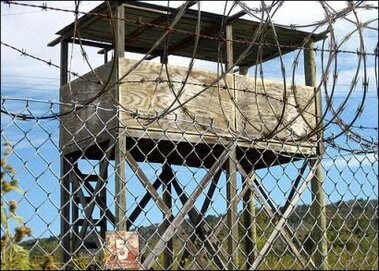 May 23 (Bloomberg) -- They're settling in for the long haul at the U.S. military prison at Guantanamo Bay, Cuba. May 23 (Bloomberg) -- They're settling in for the long haul at the U.S. military prison at Guantanamo Bay, Cuba.
Even as U.S. officials including President George W. Bush say they want to close it, work is almost finished on a $30 million state-of-the-art detention facility. More than 3,000 additional books are on their way to the library to help the 480 captured "enemy combatants" in the war on terrorism endure what may be an indefinite stay.
"We will stay here and do our mission and do it well until we no longer have a mission," U.S. Army Brigadier General Edward Leacock, the deputy commander of the detention operation, said in an interview this month at his headquarters on the 45-square-mile naval base the U.S. has leased from Cuba since 1903.
Guantanamo presents the Bush administration with a military and legal quandary. The war-crimes trials the military plans to hold for some detainees may be halted by the U.S. Supreme Court, while the release of other prisoners is being stymied by concern that they may be tortured by their governments or resume terrorist activities.
"No one would like to shut down Guantanamo more than this administration," Secretary of State Condoleezza Rice said on NBC's "Meet the Press" on May 21. The problem, she said, is what to do "with the hundreds of dangerous people there who were caught on the battlefield, who are known to have connections, who regularly say that, if they're released, they're going to go back to killing Americans."
Lightning Rod
Guantanamo has been a lightning rod for controversy since it opened in January 2002 to hold those described by Defense Secretary Donald Rumsfeld as the "worst of the worst." Called a "gulag" by Amnesty International, the human-rights organization, the camp has been criticized for holding detainees under inhumane conditions outside the protections of U.S. law and the Geneva Conventions governing the treatment of prisoners of war.
Last week, the United Nations called for Guantanamo to be closed, following similar appeals by the U.K.'s attorney general, Peter Goldsmith, and German Chancellor Angela Merkel.
Leacock said he has no desire to keep the camp open either. "My goal, and the U.S. policy, is to hold no one here any longer than we have to," he said.
Procedures are in place to trim the detainee population, Leacock said. Of the 750 prisoners who have been held at Guantanamo, he said more than 250 have been released to their countries of origin, and 140 others may be in coming months.
Military Tribunals
Of the more than 300 detainees who will remain, 10 have so far been charged with war crimes by a military tribunal, and about "two dozen others" will be similarly tried, he said.
The tribunals, in which the prosecutors, defense attorneys and juries are military officers, may be stopped before the first is even completed. The Supreme Court is scheduled to rule in June on the legality of the tribunals, which were established by Bush's executive order in the wake of the Sept. 11 attacks and have been challenged by legal and human-rights groups.
It's the detainees who haven't been charged with crimes, about 300, who may pose the greatest legal and logistical problems to eventually closing the camp. They are subject to an annual review by a military panel known as the Administrative Review Board that assesses whether to continue holding them based on two criteria: their intelligence value and the threat they pose.
Some of these detainees may never be charged, yet may remain in detention for a long time, said Captain Tom Quinn, the U.S. Navy officer in charge of the review boards.
High Threat
"There are some folks who have a threat value that's so high or an intelligence value that's so high that even though they didn't commit a war crime, we cannot afford to take the risk to let them go," Quinn said.
Leacock said "about 15" of the detainees who have been released "have gone back to the fight," including "one who won't be coming back because he was shot and killed on the battlefield."
Guantanamo officials say conditions have improved vastly since the opening of the first detention facility, Camp X-Ray, in 2002. That unit -- which achieved worldwide notoriety for images of its open-air cages and bound detainees kneeling in dust -- was only open for four months.
Critics have focused on the interrogation techniques authorized by the Bush administration, some of which were banned by the Detainee Treatment Act of 2005 sponsored by Senator John McCain, an Arizona Republican and former prisoner of war in Vietnam.
`Cruel Treatment'
Alberto Mora, a former U.S. Navy general counsel who in 2004 fought to prevent the government from adopting aggressive interrogation techniques, said yesterday that "cruel treatment" was used at Guantanamo.
The "inescapable truth is that, no matter how circumscribed these policies were or how short their duration, or how few the victims, for as long as these policies were in effect our government had adopted what only can be labeled as a policy of cruelty," Mora said in a speech accepting the Profile in Courage award from the John F. Kennedy Library Foundation in Boston.
Since the closing of Camp X-Ray, Guantanamo detainees, who range in age from 20 to 71, have been dispersed in a network of five facilities called Camp Delta, where they are held according to their degree of cooperation with interrogators and "compliance" with camp rules.
Camp Five, which houses about 100 of those deemed "high- value," least "compliant" and most dangerous, is a concrete structure modeled on a maximum-security facility in Peru, Indiana. Detainees are held in single cells, allowed no interaction with each other and given only short, solitary exercise periods. The $30 million structure scheduled for completion this summer, a medium-security facility, will be Camp Six.
Camp Four
The largest group of inmates, more than a third of the total, is housed in Camp Four, which features 10-bed dormitory- style rooms. These inmates are allowed to roam the camp at will, eat together and have free access to library books.
Camp officials say most of the detainees, who come from 40 countries and speak dozens of languages, have learned English through speaking to the guards and reading. The Harry Potter books, they say, are the most-requested volumes from the library.
Officials say the guards take particular pains to show respect for detainees' religious practices, particularly since allegations of mishandling of the Koran were published by Newsweek magazine last year, setting off deadly riots in Pakistan and elsewhere in the Muslim world. The call to prayer is broadcast throughout the camp five times a day and arrows pointing toward Mecca are painted on bunks and on the ground.
Detainee Threats
Despite the improvements, two guards at Camp Delta -- who declined to give their names for fear of retribution against them or their families by the captives -- said the detainees frequently threatened them, spat at them or pelted them with feces or urine.
So far, there have been 23 suicide attempts at Guantanamo. Three detainees have been on hunger strikes for up to 250 days and are being force-fed through tubes.
Last week, 10 inmates in Camp Four clashed with guards who intervened to prevent a "ruse" suicide attempt in the most violent uprising yet at the detention facility, according to Navy Rear Admiral Harry B. Harris. Prisoners used light fixtures, fan blades and pieces of metal to attack 10 guards who entered a communal cell to stop a detainee who appeared to be preparing to hang himself using bed sheets, Harris told reporters on a conference call.
No detainees have been sent to Guantanamo since 2004, and Leacock and other military officials said it is unlikely any new inmates will be sent there because permanent prisons have been erected in Afghanistan and Iraq. On May 8, Bush said on German television that he would "like to close the camp and put the prisoners on trial."
For now, Leacock says, his orders are to keep the camp up and running. "When the president orders me to put the `Closed' sign on the door, I will put it up," he said.
|


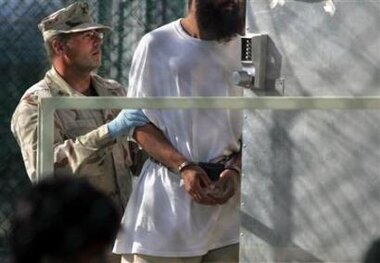
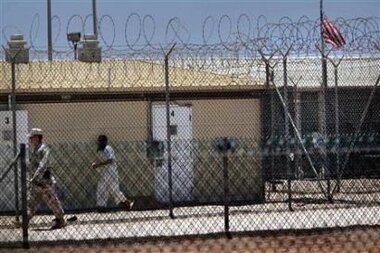 WASHINGTON • There are 67 Pakistanis on a Pentagon list of all the detainees who have been or are being held at the US prison camp at Guantanamo Bay, Cuba. The list contains the names and nationalities of 759 people who have been held under the US Department of Defence control since the jail opened in January 2002. One name, that of Saifullah Paracha, a 58-year-old Pakistani citizen, shows that the list also includes prisoners detained by other agencies, such as CIA, after 9/11. Most of the 67 Pakistanis on the list were apprehended by the same Afghan commanders they went to help and were handed over to US authorities. Pentagon issued an initial list of 558 names on April 19, which detailed the detainees who went through a military hearing process instigated in 2004. The additional 201 names on the new list are detainees who were moved out of Guantanamo before the military hearings began. The US military now holds about 480 detainees at Guantanamo after a series of releases and transfers that began in October 2002, nearly 10 months after the detention center opened. An additional 136 detainees have been approved for transfer or release, but the timing depends on when their home countries agree to accept them.
WASHINGTON • There are 67 Pakistanis on a Pentagon list of all the detainees who have been or are being held at the US prison camp at Guantanamo Bay, Cuba. The list contains the names and nationalities of 759 people who have been held under the US Department of Defence control since the jail opened in January 2002. One name, that of Saifullah Paracha, a 58-year-old Pakistani citizen, shows that the list also includes prisoners detained by other agencies, such as CIA, after 9/11. Most of the 67 Pakistanis on the list were apprehended by the same Afghan commanders they went to help and were handed over to US authorities. Pentagon issued an initial list of 558 names on April 19, which detailed the detainees who went through a military hearing process instigated in 2004. The additional 201 names on the new list are detainees who were moved out of Guantanamo before the military hearings began. The US military now holds about 480 detainees at Guantanamo after a series of releases and transfers that began in October 2002, nearly 10 months after the detention center opened. An additional 136 detainees have been approved for transfer or release, but the timing depends on when their home countries agree to accept them.  May 23 (Bloomberg) -- They're settling in for the long haul at the U.S. military prison at Guantanamo Bay, Cuba.
May 23 (Bloomberg) -- They're settling in for the long haul at the U.S. military prison at Guantanamo Bay, Cuba.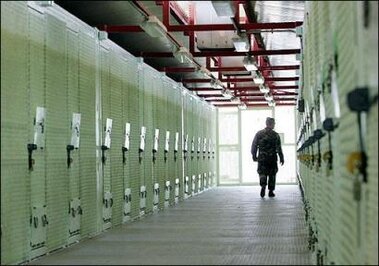 May 20, 2006
May 20, 2006 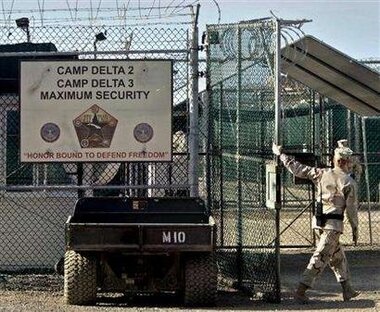 Fifteen Saudi Arabians have arrived home after being released from the United States military detention camp at Guantanamo Bay in Cuba.
Fifteen Saudi Arabians have arrived home after being released from the United States military detention camp at Guantanamo Bay in Cuba.



